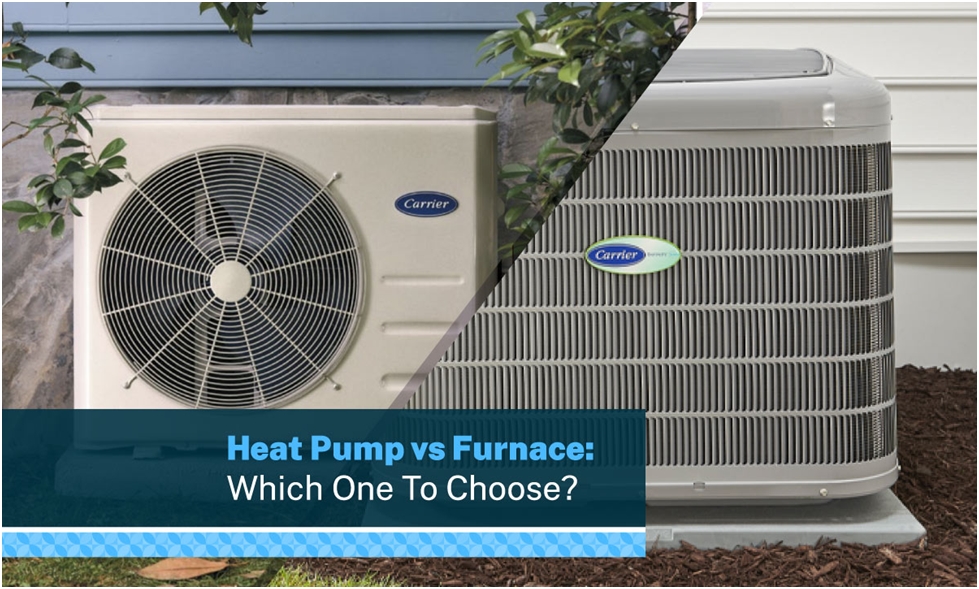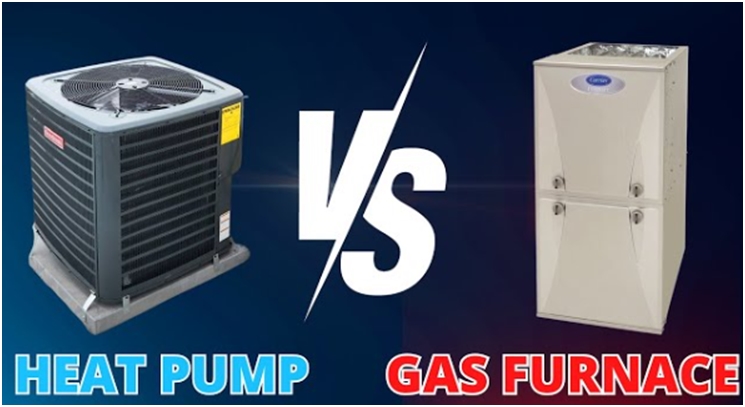
CALL TO SCHEDULE SERVICE
Furnace vs. Heat Pump: Which Heating Option is Best for Your Home?

Several types of heat pumps are available, including air-source; geothermal; ductless, mini-split; and absorption heat pumps. They differ in heating power, efficiency, maintenance, space, and cost. Both heat indoor air effectively.
Discovering the Advantages and Disadvantages of Heat Pumps and Furnaces
When it comes to selecting the perfect heating solution for your home, understanding the differences between furnaces and heat pumps is crucial. Both options effectively heat indoor spaces, but they vary in heating efficiency, energy consumption, maintenance needs, space requirements, and cost considerations. These factors fuel the ongoing debate about whether a heat pump or a furnace is the ideal choice for homeowners. Factors such as energy efficiency, safety considerations, upfront costs, installation requirements, and maintenance needs should be weighed when deciding between gas furnaces and electric heat pumps.
Choosing Between Furnaces and Heat Pumps: Which Heating Solution is Right for You?
When evaluating heating options for your home, furnaces and heat pumps are two popular choices. Each offers a unique set of benefits and drawbacks in terms of heating performance, energy consumption, maintenance needs, space requirements, and overall costs. These elements make the decision-making process between heat pumps and furnaces an important consideration.
Key Takeaways
- Climate Considerations: Your geographic location significantly impacts your choice, with heat pumps typically being more efficient in milder climates and furnaces preferred in colder regions.
- Functionality Comparison: Electric heat pumps systems are dual-purpose, offering both heating and cooling, whereas furnaces solely provide heat, necessitating an additional air conditioning unit for cooling needs.
- Efficiency Enhancements: Dual fuel systems, which combine a furnace with a heat pump, can improve energy efficiency and reduce costs, particularly under specific climate conditions.
- Decision Factors: Consider factors such as energy efficiency, safety, upfront and operational costs, installation requirements, and maintenance when choosing between gas furnaces and electric heat pumps. Explore as resource link from Carrier how do heat pumps work.
By understanding these key points, you can make an informed decision on whether a heat pump or a furnace is better suited for your home’s heating needs.
The Area as the Key Consideration
The region where you live is likely the most crucial factor in your decision-making process. Heat pumps are traditionally more effective in areas with mild winters, such as southern and coastal states. In contrast, furnaces are better suited for harsher, colder winter conditions and are typically preferred in northern locations. In the U.S., most furnaces use natural gas for combustion, though propane, oil, and electric options are also available. By choosing a heating system that matches your climate, you can achieve greater comfort and potentially reduce operating costs. It’s important to understand the differences between furnaces and heat pumps, as well as the benefits and energy efficiency of electric versus gas heating systems, to make an informed choice.

Heat Pump vs. Gas Furnace: Making the Right Choice for Your Home
When comparing heat pumps and gas furnaces, it’s essential to consider several factors such as operation methods, efficiency, maintenance, and space requirements. This guide will help you understand these critical aspects to ensure you choose the best heating solution for your home.
Electric vs. Gas Heating: How They Work
Furnaces create heat by burning oil or gas, while heat pumps run on electricity, extracting heat from the outside air—even in cold conditions—to warm your home. If you’re curious about the differences between gas furnaces and heat pumps, Due to their operation, heat pumps excel in warmer climates (zones 1-3 on the U.S. Department of Energy climate zone map) by providing supplemental heating.
Electric heat pumps are highly versatile, offering both heating during the winter and cooling in the summer, eliminating the need for separate systems for people in milder climates. In contrast, furnaces provide only heat, necessitating a separate air conditioning system for cooling during warmer months.
Clean Energy 101: Heat Pumps The energy efficiency of gas furnaces versus electric heat pumps can be complex. Technically, highly efficient heat pumps can deliver more heat energy than they consume, making them superior in terms of energy transfer. For comparison, high-efficiency gas furnaces, such as the Carrier Infinity 98 with Greenspeed® Intelligence, can reach an AFUE (Annual Fuel Utilization Efficiency) rating of up to 98.5%.
Safety Considerations
Heat Pumps | US EPA There are several safety considerations when comparing gas heat vs. electric heat pumps. Gas furnaces pose a higher risk of gas explosions and carbon monoxide poisoning compared to electric heat pumps. However, gas furnaces typically have safety features such as automatic shut-off valves and pressure regulators to prevent explosions, while electric heat pumps have safety features such as automatic shut-off switches and refrigerant leak detectors. It is important to have a qualified technician regularly maintain and inspect both types of systems to ensure their safety and efficiency.
Maintenance
Heat Pumps – Energy System – IEA Regular maintenance is crucial for heat pumps and furnaces to ensure longevity and efficiency. The good news is that both systems feature air filters that homeowners can easily replace. Heat pumps, including outdoor and indoor units, require annual cleaning and inspection, a task that can be easily managed. On the other hand, gas furnaces, while not having outdoor units, are often paired with central air conditioners.
Lifespan
The lifespan of heat pumps and furnaces largely depends on factors like usage patterns, system size, installation quality, thermostat settings, and environmental conditions. For instance, a well-maintained and properly sized furnace can last up to 20 years, while a heat pump can last around 15 years. Both systems can have similar lifespans with regular maintenance and timely repairs. Discover more about the factors affecting furnace longevity, such as the frequency of use, the quality of the installation, and the type of fuel used.
Space Requirements
Furnaces typically require at least 30 inches of clearance and are installed indoors. Meanwhile, heat pumps need only 24 inches of clearance and are installed outdoors. Additionally, air-source heat pumps require an indoor air handler unit called a fan coil. Carrier, a trusted name in heating solutions, offers a complete line of furnaces, including versatile options like propane-convertible gas furnaces and high-efficiency heat pumps suitable for almost any home.
Gas Central Heating vs. Heat Pumps
Deciding whether to replace a gas central heating system with a heat pump is a significant decision that requires careful consideration. Factors such as the existing system’s efficiency and age, regional climate, and installation costs all play a role. Heat pumps are generally more efficient than gas furnaces, but extreme cold can impact their effectiveness. It’s crucial to consider all costs—including the possibility of completely replacing a central heating system—when evaluating a switch to heat pumps.
Cost Comparison: Gas vs. Electric Heat
Gas furnaces typically have lower initial costs compared to electric heat pumps. However, they incur higher installation expenses due to the need for gas lines and ventilation. While gas is usually cheaper than electricity, lifetime operating costs, which include initial purchase, installation, maintenance, and energy costs, may be higher due to ongoing maintenance and repairs. Electric heat pumps often have higher upfront costs but can be more cost-effective over the long term, especially in moderate climates.
Oil Furnace vs. Heat Pump
In regions where oil furnaces are standard, the debate between oil furnaces and heat pumps echoes the gas furnace vs. heat pump argument. Consideration should include installation costs and the price of heating oil versus electricity. In milder climates, high-efficiency heat pumps are an attractive option. However, oil furnaces may provide dependable warmth in severe cold conditions.
Electric Furnace vs. Heat Pump
Both electric furnaces and heat pumps utilize electricity for heating and are prevalent in southern regions with milder winters. Electric furnaces produce heat through electric coils, whereas heat pumps transfer heat from outside to inside. Heat pumps may require a backup heat source in colder climates, often through electric resistance heating coils. Electric furnaces are 100% energy-efficient yet may cost up to 2.5 times more to produce the same heat as a typical electric heat pump. Heat pumps also provide cooling, in contrast to electric furnaces requiring additional summer cooling solutions.
HVAC Comfort,
Quality & Convenience
You Can Trust
Get quality HVAC Installations from A-Team Heating & Cooling
Schedule a professional AC tune up
Call us now (734) 999-7310

